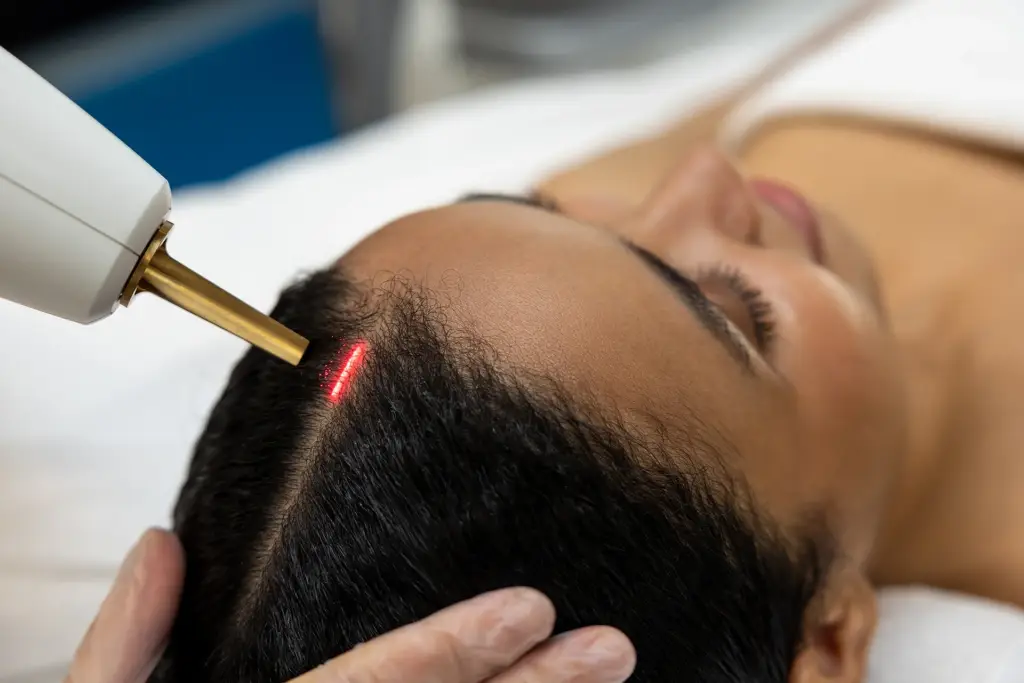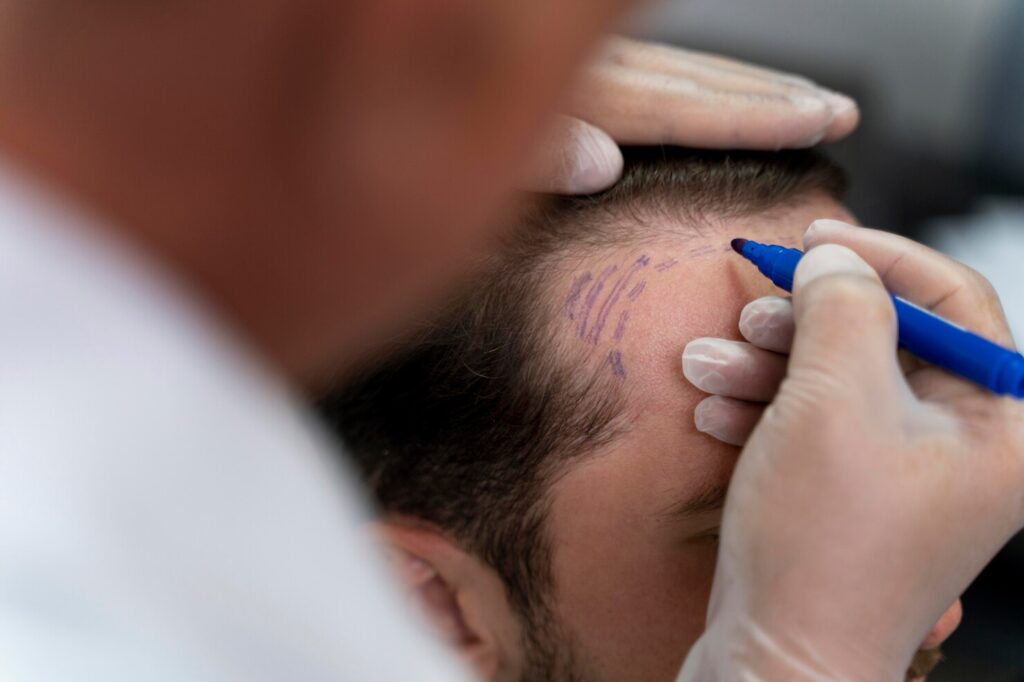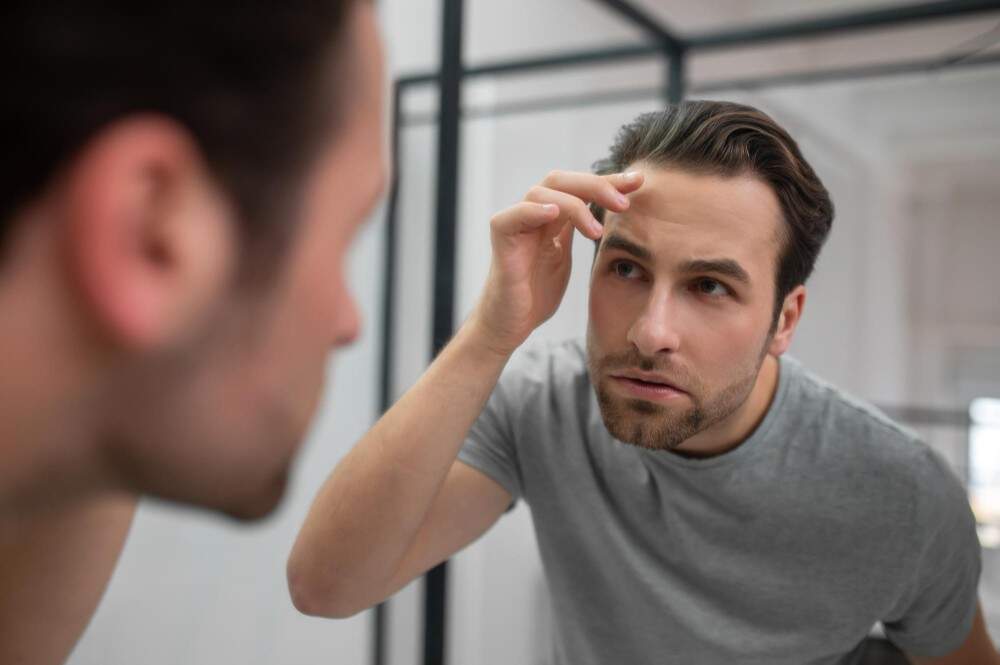Hair Laser Therapy - Low-level
Laser Therapy (lllt)
What Is Laser Therapy for Hair?
Hair laser therapy, also referred to as low-level laser therapy (LLLT), is a non-invasive procedure that uses low-level lasers or light-emitting diodes (LEDs) to encourage hair growth. This therapy helps to halt hair loss and treat conditions like alopecia by enhancing blood circulation in the scalp and stimulating hair follicles.
During the treatment, a device emitting low-level laser or LED light is placed on the scalp. The light penetrates the skin to reach the hair follicles, stimulating the cells within them and improving blood flow and oxygen supply to the scalp. As a result, this therapy is both safe and effective for men and women, with no reported side effects.
Hair laser therapy is a painless and secure procedure typically conducted in a clinical setting. Each session usually lasts between 20 to 30 minutes, and multiple sessions may be required to achieve noticeable results. This method is considered one of the most effective treatments for hair loss. Additionally, other laser technologies, such as laser combs and laser caps, are also used to promote hair growth.


What Are the Advantages of Laser Therapy for Hair Transplants
Hair laser therapy can offer several benefits for hair transplant patients, including:
Accelerated healing: Laser therapy can speed up the healing process following a hair transplant procedure. It minimizes the risk of scarring and promotes healthy hair growth.
Enhanced hair growth: Laser therapy combats hair loss by stimulating hair growth and improving the overall health of hair follicles, resulting in increased hair density after a hair transplant.
Reduced inflammation: Hair transplant procedures can cause inflammation and discomfort in the scalp. Laser therapy can help reduce inflammation and soothe the scalp.
Improved blood circulation: Laser therapy boosts blood flow to the scalp, nourishing hair follicles and promoting healthy hair growth.
Non-invasive: Unlike certain hair restoration methods like surgical hair transplants, laser therapy is non-invasive. It doesn’t involve incisions or stitches, minimizing the risk of complications and discomfort.
Laser hair therapy is also a beneficial complement to hair transplant procedures, as it aids in promoting healthy hair growth and enhancing the overall appearance of the hair.
Ideal Candidates for Hair Laser Treatment
Hair laser therapy is generally considered safe and effective, offering benefits for many people experiencing hair loss or thinning hair. However, it may not be suitable for everyone. The following factors can help determine whether a person is a good candidate for hair laser therapy:
Hair type: This therapy is most effective for those with thinning hair or mild to moderate hair loss, and may be less effective for individuals with advanced hair loss or complete baldness.
Cause of hair loss: It works best for individuals with androgenetic alopecia, a common form of hair loss caused by genetics and hormonal factors. It is less effective for those with hair loss due to medication or medical conditions.
Age: Hair laser therapy is most effective in the early stages of hair loss, helping to stimulate hair growth and prevent further loss. However, it can still offer benefits to older individuals with more advanced hair loss.

Health status: Laser hair therapy is generally safe for most individuals. However, it may not be appropriate for those with certain medical conditions or who are on specific medications. It is crucial to discuss any health conditions or medications with a doctor before starting laser hair therapy.
Personal preferences: Laser hair therapy is a non-invasive and painless procedure, but it requires multiple sessions over several months to achieve noticeable results. Individuals seeking immediate and dramatic outcomes may find other hair restoration treatments, such as hair transplant surgery, to be more suitable.

Phases of Laser Hair Treatment
Hair laser therapy typically involves several stages, which may vary depending on the provider’s specific treatment protocol. However, here are the general stages of hair laser therapy:
- Consultation: The first stage of hair laser therapy is usually a consultation with a doctor. The patient’s medical history and hair loss patterns are evaluated during the consultation. The doctor also examines the scalp to determine if laser therapy is suitable.
- Preparation: The patient’s hair is washed before the laser therapy session. It is to remove any oils or dirt that could interfere with the treatment. The patient may also be given protective eyewear to prevent any potential eye damage from the laser or LED light.
- Laser or LED application: The patient sits or lies down during the laser therapy session. Then, a device emitting low-level laser or LED light is placed on the scalp. The device is moved around the scalp to ensure all areas are treated. The session typically lasts about 20 to 30 minutes.
After undergoing laser treatment, patients can resume regular activities immediately. However, it’s advisable to follow certain post-treatment care guidelines to protect the hair. These include avoiding direct sunlight, using mild hair products, and steering clear of harsh chemicals or treatments that could potentially damage the hair.
Follow-up sessions for laser therapy typically occur over a span of weeks or months, with the frequency and number of sessions tailored to each patient’s response and the extent of their hair loss. The specifics of the treatment plan are determined by individual needs and the recommendations of the healthcare provider.
To determine whether laser therapy for hair loss is suitable, it’s recommended to seek guidance from a professional or a specialist in hair loss. They can assess the pattern of hair loss and overall health, and take personal preferences into account when determining the suitability of laser therapy as a treatment option.

